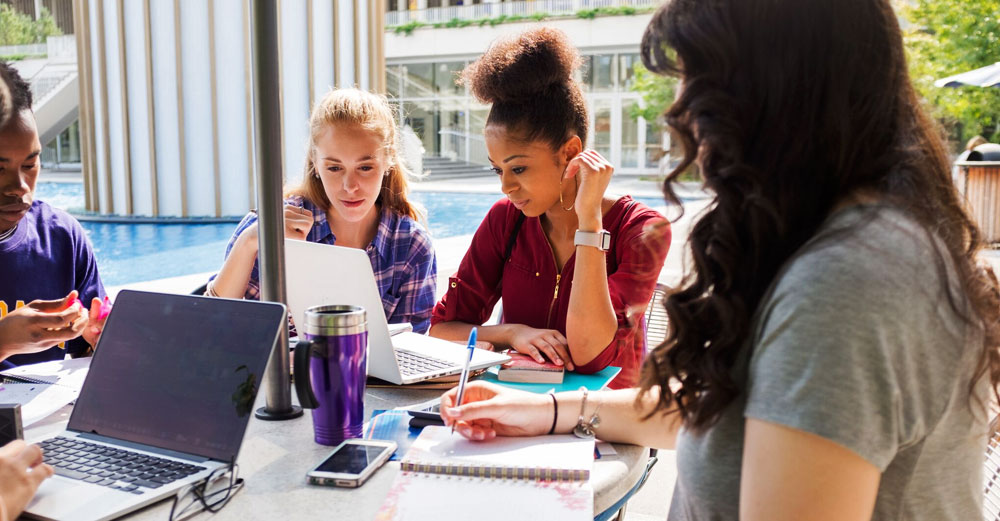
With the semester going by fast and midterm exams passing by with finals slowly approaching, the workload can become overwhelming. Have you had exams already? Are you procrastinating? On your social media a lot? Whatever your situation, we need to stay on top of our study habits to make it through each semester successfully. Fortunately, we keep up to date on the latest trends and research in study tips. We’ve found 5 quick studying tips backed up by research that might help you efficiently ace those exams and end this semester with great success.
Apply Your Learning
How information that is learned can be applied to your every-day life can make a tremendous difference on your understanding of the concept. Applying your learning in a study setting will help you understand how the core concept of the class correlates to the material. Using applied learning to study for your exams also shows a positive correlation to test grades.
For example, if you are taking a biology class, actively recalling what the chemical properties of salt is while using it when cooking can make learning the chemical compounds easier. Luckily, SUNY schools offer ample opportunities to obtain internships and jobs that give you the hands-on experience needed to apply information to your daily life.
In addition to helping you ace your tests, what you learn while studying for your tests can be applied to full internships or future jobs that may be obtained as a head start to a career.
Practice Spaced Learning
Spaced learning is when you allocate times to study instead of cramming all the information you have to learn into a few days prior the test. When you study for hours non-stop, your learning potential decreases. Do you notice that your mind starts to wander after a few hours into a long study session? Cramming, also known as massed learning, will decrease the efficiency of your learning. Although procrastinating is a hard habit to stop, procrastinators are actually more likely to have higher test anxiety according to this 2007 research study. Procrastinating can serve as a handicap and may prove as a burden if important tasks are put off and piled up for a later time. A way you can practice spaced learning is noting down when you have exams, and set times a few days or even weeks before the exam to start studying for them.
Turn off your social media
We know how hard it is to resist the temptation of replying back to your friend’s snapchats or messages, but turning off your phone while you are studying can be beneficial in preventing distractions. A recent study tells us that multi-tasking between study and social media seems to be rather distracting, causing students who are heavy users to tend to perform slightly worse than other students. Your social media can wait when focusing on your studies is the primary objective.
If you know you won’t get your work done when you have others surrounding you, try studying in a private area. Ask yourself if knowing what your friends are up to is more important than studying for the exam coming up. If you separate from your social media, not only can this help you focus on studying but you can also focus more on yourself. Making a conscious choice to study, and setting up your environment accordingly, will empower you to be less distracted by extrinsic rewards and focus on what matters at the moment.
Take Study Breaks
Can’t concentrate after an hour of studying? Taking a mini break and implementing light physical activity has been shown to improve your memory in just 10 minutes of activity. The Hippocampus in your brain, which is associated with short and long term memory was shown to have strengthened activity when stimulated during study breaks. Getting up to move around and stretch can clear the mind so that when you return to your studies, you may focus better. Instead of going through your social media, try going outside and getting a breath of fresh air.
Teach the Subject
“While we teach, we learn” said Seneca, the Roman Philosopher. Teaching a subject that you have just learned may be difficult, but teaching the subject shows that you are taking in the knowledge that you have learned and you are using higher cognitive functions to explain the material in a way that makes sense to peers and to yourself. In a study done in 2007, a group of students that were assigned to teach their peers scored better on a test than group of students who who knew they were getting tested but didn’t need to teach their peers. The phenomena is actually dubbed “Protégé Effect.” Knowing that you will have to teach the information to others makes you want to understand the material well enough so you will feel comfortable relaying it to others.
These tips are meant to make your exams may weigh a little less heavy on your mind. Doing well on your exams is important, but your well-being is more important! Students need to enjoy the college experience and try not to get too overwhelmed with all their activities. Remember to take study breaks and nourish yourself, because having a healthy mindset will impact how your overall college experience will be like. When we work smarter, not harder, success is more easily reached.




This is a very useful article. If I may add some more:
1. Clean the room you are about to study in. Research shows that the messier your surrounding are the more distracted you are.
2. Drink lots of water and try to cut down on coffee or energy drinks. If you are dehydrated or hyperactive there is a big chance you will get a severe headache.
3. If you can assure a fresh air flow in the room you are studying in. Open the window or move to the back porch. The oxygen will stimulate your brain and help you concentrate.
Great post. Now on my Blackboard for my students.to read.